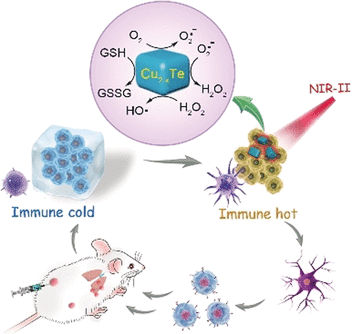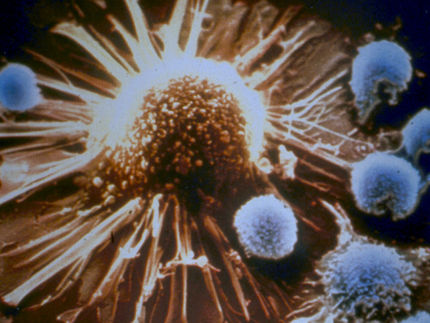Immune System Upgrade: nanoparticles act as artificial enzymes
Catalytic immunotherapy for cancer
Theoretically, our immune system could detect and kill cancer cells. Unfortunately, tumors are well armed to fight these attacks. Despite modern cancer treatments, metastases and relapses remain a major problem. Increasing anti-tumor immunity might now be made possible, thanks to copper telluride nanoparticles that mimic enzymes, especially under NIR-II light irradiation. This induces oxidative stress in tumor cells, quashing their immunosuppressive status and triggering inflammatory processes, as Chinese scientists report in the journal Angewandte Chemie.

© Wiley-VCH
So-called “Nanoenzymes” are hot candidates for treatments called “catalytic immunotherapy”. These nanoparticles have structures completely different from biological enzymes but mimic the enzymes’ catalytic activity. They are easier to prepare than natural enzymes, as well as being less expensive and more stable.
Researchers working with Wansong Chen and You-Nian Liu at Central South University (Changsha, Hunan, China) have now introduced a new nanoenzyme: copper telluride nanoparticles (Cu2-xTe) mimic the activities of the enzymes glutathione oxidase and peroxidase. The activity of this nanoenzyme is due to the copper ions, which switch between two oxidation states. The substrate is glutathione, an antioxidant that is found in significantly higher concentrations in tumor cells than in healthy ones. This is why the nanoenzymes are only active in tumor cells. In addition, they absorb NIR-II light (near-infrared light with a wavelength between 1000 and 1350 nm), causing their local environment to heat up. This effect strongly increases the enzyme-like activity of the nanoenzymes. In treatment, the NIR-II irradiation could be selectively applied to the tumor.
Experiments in tumor-cell cultures and with tumor-bearing mice demonstrated that use of the nanoenzymes and NIR-II irradiation triggers a whole cascade of cellular responses that greatly increase the oxidative stress within the tumor, which ultimately leads to cell death. At the same time, the suppression of immunological processes in the microenvironment around the tumor is lifted. Instead, substances that promote inflammation are released and an immune response is triggered. This is supported by the elevated concentration of effector T cells observed by the researchers. The immune system is thus able to learn to defend itself against metastasis and to build an “immunological memory” to prevent relapses.
Original publication
Other news from the department science
These products might interest you

Eclipse by Wyatt Technology
FFF-MALS system for separation and characterization of macromolecules and nanoparticles
The latest and most innovative FFF system designed for highest usability, robustness and data quality

DynaPro Plate Reader III by Wyatt Technology
Screening of biopharmaceuticals and proteins with high-throughput dynamic light scattering (DLS)
Efficiently characterize your sample quality and stability from lead discovery to quality control

Get the life science industry in your inbox
By submitting this form you agree that LUMITOS AG will send you the newsletter(s) selected above by email. Your data will not be passed on to third parties. Your data will be stored and processed in accordance with our data protection regulations. LUMITOS may contact you by email for the purpose of advertising or market and opinion surveys. You can revoke your consent at any time without giving reasons to LUMITOS AG, Ernst-Augustin-Str. 2, 12489 Berlin, Germany or by e-mail at revoke@lumitos.com with effect for the future. In addition, each email contains a link to unsubscribe from the corresponding newsletter.





















































